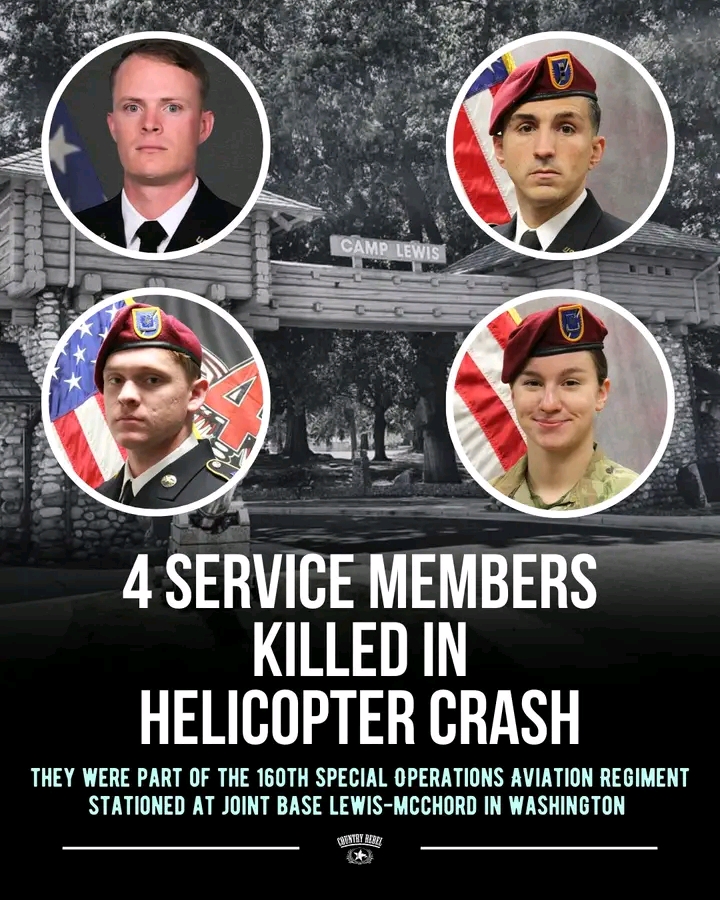
Washington State – In a devastating incident that has gripped the nation, four highly trained U.S. Army soldiers were killed when their military helicopter crashed in a wooded area near Joint Base Lewis-McChord during a nighttime training exercise on September 17. Now, after days of speculation and anguish, the U.S. Army Special Operations Command (USASOC) has officially confirmed the deaths of all four servicemembers on board.
The crash involved a MH-60 Black Hawk, a heavily modified version of the iconic helicopter used by the Army’s 160th Special Operations Aviation Regiment (Airborne)—better known as the “Night Stalkers”, an elite group responsible for transporting special operations forces into the most dangerous missions around the globe, often under cover of darkness.
A Mission Turned Tragic
The accident occurred during a routine nighttime training mission near Summit Lake, in Thurston County, a forested area west of Olympia. Witnesses in the area reported hearing a low-flying aircraft followed by a thunderous boom around 9:00 PM. Moments later, emergency services began receiving calls about a fire and a possible aircraft down in the woods.
Local fire departments responded quickly to the crash site, battling flames that had engulfed parts of the wreckage and ignited surrounding brush. The resulting wildfire burned through more than an acre before being brought under control.
Because of the intense heat and risk of unexploded ordinance, recovery operations had to be temporarily suspended. Law enforcement and first responders described the site as difficult to access, with thick terrain and dangerous conditions delaying efforts to reach the wreckage and those onboard.
Army Confirms Identities of the Fallen
On September 23, USASOC released the names of the four fallen soldiers, all members of the 160th SOAR (A):
Chief Warrant Officer 3 Andrew Cully, 35, of Sparta, Missouri
Chief Warrant Officer 3 Andrew Kraus, 39, of Sanibel, Florida
Sergeant Donavon Scott, 24, of Tacoma, Washington
Sergeant Jadalyn Good, 23, of Mount Vernon, Washington
“These soldiers represented the best of the best,” said Lt. Gen. Jonathan Braga, commander of USASOC. “They were more than just elite aviators — they were warriors, teammates, and patriots who volunteered for the most dangerous assignments in defense of this country. We grieve deeply for their families, their teammates, and their legacy.”
‘Night Stalkers Don’t Quit’ – A Brotherhood in Mourning
The 160th SOAR (A), often called the “quiet professionals,” perform high-risk, high-reward missions that most Americans never hear about. From carrying Navy SEALs into Bin Laden’s compound to secret extractions in war zones, they are the Army’s go-to aviation unit for top-tier operations.
Their motto, “Night Stalkers Don’t Quit,” isn’t just a phrase—it’s a creed. And yet, the crash has delivered a gut punch to this tight-knit community.
An anonymous former Night Stalker told reporters: “Every one of these training missions is done with precision. But we all know the risks. That’s what makes this loss so devastating—these were not just pilots or crew. These were heroes in every sense.”
Community and First Responders Rally Around the Fallen
In the days following the crash, a solemn procession escorted the fallen soldiers from the crash site back to Joint Base Lewis-McChord. Fire trucks, police vehicles, and emergency responders lined the route, lights flashing in silent tribute. Civilians stood along the roadside with flags, some holding back tears.
The Thurston County Sheriff’s Office, along with Griffin Fire Department, McLane Black Lake Fire, Olympia Fire, and others, were praised for their efforts in both the recovery and the respectful transfer of the remains.
In a statement, USASOC wrote:
> “We extend our deepest gratitude to the local fire and rescue units, law enforcement, and civilian partners who responded with speed, professionalism, and compassion. Your support in our darkest hour has not gone unnoticed.”
What Went Wrong? Investigation Underway
The cause of the crash remains under investigation. Army safety officials and federal investigators have been dispatched to examine every angle—mechanical failure, human error, weather conditions, and mission parameters are all on the table.
Preliminary reports indicate that the weather was clear and stable at the time of the flight, making mechanical failure a possible culprit. However, officials are being tight-lipped, cautioning against speculation until the crash data recorders and flight logs are analyzed.
Historically, the MH-60 Black Hawk has had a strong safety record. But special operations helicopters are often outfitted with custom modifications, which can sometimes introduce unique challenges.
A Nation Reflects — And Waits for Answers
This tragedy has sparked a national outpouring of support, especially among veterans, military families, and the broader special operations community.
On social media, the hashtag NightStalkersNeverForget has trended, with thousands sharing tributes, stories, and condolences. Memorials have already been set up at Joint Base Lewis-McChord and Fort Campbell, the regiment’s home base in Kentucky.
But with grief comes demand for clarity.
Military watchdogs and aviation safety experts are urging the Army to be transparent as the investigation unfolds, not only to provide closure for the families but also to prevent future incidents.
More Than Just a Headline
While the nation mourns, the families of Cully, Kraus, Scott, and Good now face a new reality—one filled with grief, pride, and unanswered questions. They weren’t just soldiers. They were sons, daughters, siblings, friends, and warriors who signed up to serve a country they loved.
As one mourner posted online:
> “These are the names that should be in headlines. Not for how they died, but for how they lived—bravely, quietly, and with honor.”
And for now, the nation waits—not only for answers but for a way to honor these heroes that feels worthy of their sacrifice.
[If you or someone you know is a member of the armed forces and needs support during this difficult time, resources are available through Military OneSo
urce and the Army’s Family Advocacy Program.]

Leave a Reply